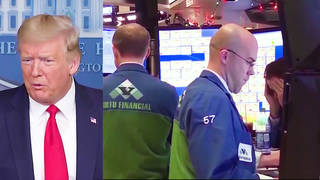
Related
Topics
Guests
- William GreiderNational affairs correspondent for The Nation magazine. He is the author of several books, including The Soul of Capitalism: Opening Paths to a Moral Economy and One World, Ready or Not: The Manic Logic of Global Capitalism. His forthcoming book is called Come Home, America: The Rise and Fall (and Redeeming Promise) of Our Country.
The House has passed an $819 billion stimulus package, marking one of the most expensive pieces of legislation ever to move through Congress. Not a single Republican voted for the bill. We speak to William Greider, national affairs correspondent for The Nation magazine. [includes rush transcript]
Transcript
AMY GOODMAN: The House approved an $819 billion stimulus package Wednesday, marking one of the most expensive pieces of legislation ever to move through Congress. Despite an all-out lobbying push by President Obama, the bill passed without a single Republican vote. Eleven Democrats also opposed the measure.
The Los Angeles Times says the package is “the largest attempt since World War II to use the federal budget to redirect the course of the nation’s economy.” The two-year stimulus plan totals $275 billion in tax cuts and nearly $545 billion in domestic spending. It would provide up to $1,000 per year in tax relief for most families, increase funding for alternative energy production, and direct more than $300 billion in aid to states to help rebuild schools, provide healthcare to the poor and reconstruct highways and bridges.
House Republicans argued the bill tilted heavily toward new spending instead of tax cuts and that it would do little to stimulate the economy. This is Georgia Republican Paul Broun.
REP. PAUL BROUN: I see this as a huge leap toward socialism as a nation. It’s creating new government programs, it’s creating new government jobs, that don’t have any sunlight to those programs, to those jobs. It expands programs that are already there. It further — some of the tax relief, I believe and hope the gentlemen will agree with me, actually just furthers through the refundable tax credits a dependency upon government. My friend Star Parker had wrote a book one time that she called Uncle Sam’s Plantation. And what this does is it economically enslaves people. And that’s what we see happening.
AMY GOODMAN: President Obama hailed the passage of the legislation and made no mention of the unanimous Republican opposition. He will now turn his attention to the Senate, where Democrats are scheduled to begin debate on the measure on Monday and the price tag is likely to reach $900 billion.
Hours before yesterday’s House vote, President Obama told a group of about a hundred business leaders that Congress must not delay efforts to restart the economy and put people back to work.
PRESIDENT BARACK OBAMA: The businesses that are shedding jobs to stay afloat, they can’t afford inaction or delay. The workers who are returning home to tell their husbands and wives and children that they no longer have a job and all those who live in fear that their job will be next on the cutting blocks, they need help now. They are looking to Washington for action, bold and swift. And that is why I hope to sign an American recovery and reinvestment plan into law in the next few weeks.
And most of the money that we’re investing as part of this plan will get out the door immediately and go directly to job creation, generating or saving three to four million new jobs. And the vast majority of these jobs will be created in the private sector, because, as these CEOs well know, business, not government, is the engine of growth in this country.
AMY GOODMAN: Obama’s comments come at a time when the economy that is losing more than half a million jobs a month, including more than 65,000 layoffs announced just this week.
William Greider joins us now, the national affairs correspondent for The Nation magazine; the author of several books, including The Soul of Capitalism: Opening Paths to a Moral Economy and One World, Ready or Not: The Manic Logic of Global Capitalism. His forthcoming book is called Come Home, America: The Rise and Fall (and Redeeming Promise) of Our Country. He joins us in our firehouse studio.
Welcome to Democracy Now!
WILLIAM GREIDER: Thanks, Amy.
AMY GOODMAN: It’s good to have you here in the studio.
WILLIAM GREIDER: Likewise, yes.
AMY GOODMAN: The state of the economy right now, what President Obama just said, the fact that they’ve pushed through this more than $800 billion economic stimulus package. The House at this point, with — as Boehner, I think, came onto the floor with a — holding his hand up in a big zero, saying the Republicans are not going to give them anything.
WILLIAM GREIDER: The Republicans, it’s very clear, they are staking out a sort of — what they think is a no-lose, hard-right position: “We will be against anything significant this new president is attempting, because we know it’s going to fail, not because it’s Obama’s fault, but because this force, the negative forces bearing down on our economy and the world are overwhelming.” So they think, you know, six months from now they will say, “We told you this was socialism,” “We told you this was wasteful,” etc.
I think they’re wrong on several —- I think the President is doing what he said he would do. He’s trying to be bipartisan. And I suspect he will keep doing that, regardless of the Republican position, because he understands that the country is in deep trouble, and people are not interested in another cat-and-dog fight. They want to see something happen. If it doesn’t work, do something more, try something else. But the idea of just standing back and making their ideological speeches about socialism is ridiculous.
AMY GOODMAN: Seems like the person who’s leading the way now, who lost a little support over the last few years but is coming back with a vengeance, is Rush Limbaugh leading the charge.
WILLIAM GREIDER: Is he pounding that drum? Well, he’s welcome to it. I think there’s a long-term political strategy that the President is following, which is good for him, and good for the country maybe, in which he said he’s speaking not to Rush Limbaugh, not to John Boehner and the right-wingers in the Congress; he’s talking to just folks all across the country, including Republicans.
AMY GOODMAN: Now, I’d like you to lay out what the terms of this bill are, what the package are. But then I want to go beyond the Democratic-Republican spectrum -—
WILLIAM GREIDER: Yeah, yeah.
AMY GOODMAN: — about what you think needs to happen. What’s in this bill?
WILLIAM GREIDER: A lot of really good stuff that will be stimulative, just because it keeps — either keeps people working or it creates new jobs and begins — only begins, but begins — these deeper reform imperatives the country faces, like energy conservation and conversion, like ecological protection, expanding healthcare for people, especially at the bottom end of the income ladder. In any other season, Amy, it would be quite extraordinary to stand back and see what they’re doing. In our present circumstances, I have to say, it is probably not enough to —-
AMY GOODMAN: Well, you’ve said it’s two or three times too small.
WILLIAM GREIDER: Yeah. I mean, you can measure what’s missing now in demand and business activity and lay it alongside this package, and this package looks way inadequate. I think the White House understands that, but they’re not going to triple it. What they are doing is starting a process that will at least, perhaps, slow the hemorrhage. That’s -— I’m sure that’s their hope.
There are a bunch of obstacles that I think make it very difficult to get out of this ditch. One of them is scale, the scale of what kind of response you’re — another is the financial system, which, despite the hundreds of billions pumped into banks, is still essentially dysfunctional. And they’re now wrestling at the Treasury Department and the White House with, OK, how do we change the game that Henry Paulson and the Republicans played for six, nine months unsuccessfully?
AMY GOODMAN: And do you expect someone like Timothy Geithner, who — yesterday we had on Independent Senator Bernie Sanders, who is opposed to his confirmation, saying he was part of this massive problem. Do you expect that he would be able to?
WILLIAM GREIDER: Well, I am among those who urged our new president not to appoint him for that very reason. And —-
AMY GOODMAN: Did you talk to Obama about that?
WILLIAM GREIDER: No, no. I’m just -— in the pages of The Nation — I’m not sure he’s a reader, but perhaps he will become a reader as things get worse. I’ve been writing for some months, the system is not just broken and not just injured; it is collapsed. And as long as the government continues to play putting Humpty Dumpty back together again, I think it will fail. That’s not an ideological statement. It’s just — I think it’s the reality.
And so, I hope, without great confidence, that Larry Summers, the economic adviser, and Tim Geithner and the President decide to take a deep breath, jump over the political barriers and say, “We are taking control of the banking system, temporarily, maybe for a few years. But we have to make this system function for the American economy right now.” And handing them the money and asking them to do the right thing is not sufficient. We know that. It’s not just their excesses; it’s the fact that the banks have a very clear self-interest in not lending, in not beginning investment. They’re hunkering down, trying to save themselves from total failure. Once the government makes that recognition, then it can direct things more forcefully and intelligently.
And I don’t expect them to do that, but I just add this: I hope, I hope that the President is saying to his economic wizards, “OK, we’re going to do your plan, your halfway steps and the many parts to it. But what’s your second plan? When this doesn’t succeed, what do I do then?” because if they don’t do that, they’re going to wind up caught in the same game that Henry Paulson and George Bush were caught in. You try this, you throw some money this way, you throw it that way, nothing happens, and then you come back with a new plan, and so forth.
AMY GOODMAN: Bill Greider, we’re going to come back to this discussion. I want to ask you more about nationalizing the banks. Bill Greider is with us, national affairs correspondent for The Nation magazine. His forthcoming book, Come Home, America. Stay with us.
[break]
AMY GOODMAN: Our guest is Bill Greider. He is with The Nation magazine. His forthcoming book is called Come Home, America: The Rise and Fall (and Redeeming Promise) of Our Country.
So, you’re on the train yesterday. You bump into Bill Parsons, the —-
WILLIAM GREIDER: Richard Parsons.
AMY GOODMAN: Richard Parsons, rather.
WILLIAM GREIDER: You don’t bump into Richard Parsons. He’s -— he was the leader of Time Warner. He’s just now been made chairman of the board at Citigroup.
AMY GOODMAN: And you’ve been calling for the nationalizing of banks like Citigroup.
WILLIAM GREIDER: Well, I think they should just get it over with and close Citigroup down, because it’s insolvent. And —-
AMY GOODMAN: Did you tell Richard Parsons this on the train?
WILLIAM GREIDER: I didn’t. That would be, first of all, impolite. But secondly, we were in what Amtrak calls the quiet car, where you do not talk. So that’s my excuse for not badgering him.
But you know what he was doing. He witnessed what happened to the three executives of the auto companies when they flew their private jet to Washington with their hands out for money, and he decided, given that Citigroup has now received, what, $45 billion straight up and another $300 billion in guarantees, it would be awkward for him to fly in to his meeting with the President. Obama had a bunch of corporate execs in yesterday to lead cheers for them and get them going. And good for him, right? He’s down with the folks. Of course, it was in the -— he’s on the Acela train, which is the fast train.
AMY GOODMAN: Well, I guess the question is, is Citigroup down with the folks? And what has happened to the billions of dollars that have been given to bail out these companies that they are not accounting for? And it’s not just President Bush. It’s not just Henry Paulson. The Democrats joined with the Republicans in supporting this.
WILLIAM GREIDER: Absolutely. This has been, up to now, bipartisan failure, and it continues not to have the crucial feature, which is answering the question: What does the public get for this money? And this sounds unbelievable, but it’s literally true. The government, Treasury and the Federal Reserve pumps this money in and demands almost nothing in return, in terms of a prescribed behavior, guaranteed conduct — we will do this, we will stop doing that, so forth and so on.
So these guys are all going out and — you know, Citigroup was embarrassed just last week, because somebody revealed that they had on order and were about to get a new $50 million executive jet. And that’s why Richard Parsons is on the train this week, because as soon as the public finds that out, they’re thinking, “Oh, no. They’ve done it again!” And it’s just very simple political logic for Washington to say, “We have to exercise control over these institutions, at some level of penetration, to stop this misbehavior, first, and then to make them do some positive things that the country needs right now.” And in the case of Citigroup, this is —-
AMY GOODMAN: You say it’s insolvent.
WILLIAM GREIDER: Yeah, that’s not an opinion of mine. I mean, I talk to people who are really serious bank specialists, and they’ve been saying that for many months. It’s the so-called toxic assets in their -— and this is not unique to Citigroup — but the toxic assets that build up in a way that you — that the government — if it tried to do this for every one of the largest banks, it would make this stimulus package look like peanuts. It’s huge. It’s maybe a couple of trillion dollars still out there.
I think you can get pretty old-fashioned about this. The bank examiners go in, and they make Citigroup lay it all out. And at some point, they can decide: “This bank is too gone to save. It’s too big to save, and it’s got too much failure already in it. So we will organize its liquidation.”
The other alternative is to nationalize it and begin to deconstruct the bad pieces and build new banks. I mean, to me, this is the exciting prospect. This is boring to a lot of people, but it’s the heart of the matter. If you don’t nationalize it, then you’re simply sort of prettying up, you know, the old roses and hoping that they bloom again.
What government should be doing now, and it’s a long process, is rebuilding the banking and financial system across the entire country so that it serves the economy, serves the society, rather than being these little citadels of high profit and extraordinary salaries. What happened in the last twenty-five years is that everything got concentrated in big guys, including really strong regional banks that got swallowed up by the bigger banks. Thousands of smaller community banks got wiped out. Either they got sold or they closed down, etc. This is a huge project, and we won’t get back to what Americans at large can regard as an equitable and prosperous economy until that structure is rebuilt. Citigroup is not going to do that. Even if you prop it up for ten years, it’s not going to do that.
AMY GOODMAN: What are the forces that would do that?
WILLIAM GREIDER: Politics, actually. I mean, and people around the country. I’ve done a lot of reporting over the years, on the ground, with just people in different parts of this country trying to — as I described them in my earlier book, trying to reinvent capitalism, trying to make it not just humane but socially supportive to industry, small businesses, consumers, workers, etc. They’re terrific people. They’re very smart. A number of them are veterans of Wall Street. They did a few years making high salaries and ripping and running in the markets, and they said, “That’s not what my life is about,” and they went to Oklahoma or California or wherever and started firms, that are investment firms, that operate on very different principles. If I were king, or if I had the President’s ear, I would say, “Get those people into the White House now.” There are thousands of them.
AMY GOODMAN: Can you think of examples?
WILLIAM GREIDER: Well, the names are — there’s a — I just heard from her. I’m going to blank her name, but she’s from Portland or somewhere on the West Coast. She has — I think it’s called 21st Century Investments. Don’t hold me to the names. But she is one of those people, and she just sends out a report every once in a while: “These are the companies we’ve just invested in.” And, of course, the investment standards of those companies — for those companies are the same standards any of us would want to apply. Are they sound ecologically? Do they treat their workers with equity and fairness and include them in the decision making? Are they viable? Do they have a future? Are they making something the country will need?
All I’m getting at is, if we get our heads out of Washington for a minute and look across the country, there is enormous potential for reinvention and innovation, and not just in that area but in others. And that’s what I’m hoping this president will get to.
AMY GOODMAN: Bill Greider, I want to ask you what role economic globalization played in all of this. Right now, at the World Economic Forum, Wen Jiabao, the Chinese premier, said Beijing blames the United States for the economic breakdown, saying, “inappropriate macroeconomic policies […] and […] unsustainable model of development characterized by prolonged low savings and high consumption; […the] blind pursuit of profit; […] and the failure of financial supervision” all contributed.
WILLIAM GREIDER: Wow! That’s strong. That’s very.
AMY GOODMAN: And China is the largest holder of US government debt.
WILLIAM GREIDER: Did he — China is our banker. I mean that literally. China, having accumulated huge trade surpluses and capital, has been the lender. It’s not the only one — there are others — but it’s the lead lender that has kept Americans going in the illusion that you could, year after year, borrow and spend more than you produced. Economics doesn’t allow that, not forever — for a while maybe, but not forever.
And so, we’re in a position now where China — we have to get a bailout from China and Japan, the Arab oil states and some others to keep us going as we work through this huge global recession. And I think the deal that’s possible is that the US can say to those creditors, “OK, give us the loans. We’ll go a bit deeper in the hole of debt. But we — because we’re such good consumers, we will be the lead engine that pulls the world out of this recession. In exchange, we are telling you now that the trade system, the global trading system, must be reformed and balanced. We can’t go on like this. Ultimately, you can’t go on like this.”
And by that, I mean bringing down the trade deficits, which have rung up more than $5 trillion in debt over the last fifteen years; imposing some rules on US multinationals, so that they can’t just roam the world as free riders, moving jobs and production wherever they choose without regard to the home country. I mean, there’s a long list of reforms, which I’ve written about and I write about in this new book. My point is, this is a moment. If the Obama administration has the nerve to go for a global compact that doesn’t just help a recovery but actually rearranges the world in fundamental terms — I don’t know if they’re big enough to do that —-
AMY GOODMAN: And those terms are…?
WILLIAM GREIDER: Well, you’d start with balanced trade, not perfectly, but -— and you’d start with a new global institution for finance that represents both, not just the advanced countries with strong economies, but the developing countries, and balances their interests through currency exchange and other — it would begin to build a structure of global rights for workers and communities, which is, of course, absent, utterly now. And by that, I mean a way to mediate between the high-wage workers in countries like ours, in Europe, Japan, and those folks at the bottom who are in the sweatshops.
I mean, the reality of our time, not so well understood, is that it’s very much like the English Industrial Revolution. The workers are exploited on both ends. If you think of the — you know, William Blake, the poet, wrote about the “dark Satanic mills” in England in 1800. The skilled craft workers were thrown out of their jobs, and they were replaced with children. And the children, of course, were completely defenseless and exploited. But so were those other workers who had been cut out of the prosperity that their country was achieving. That’s a small picture of what is happening globally now. And I’m among those who have been railing at this for twenty years, actually, without much effect.
But now we’re in a crisis that maybe will awaken the governing elites to the reality that they have to confront this and build labor rights and other protections into the system, or we’ll go right back into that hole.
AMY GOODMAN: It’s interesting you talk about building labor rights, because last fall it was reported Bank of America received something like, what was it, $25 billion from the government. Three days later, according to the Huffington Post, Bank of America’s top executives were busy. Were they trying to right the sinking ship? No, they were coordinating a conference call to organize opposition to the Employee Free Choice Act —-
WILLIAM GREIDER: Absolutely.
AMY GOODMAN: —- the top legislative priority of organized labor unions.
WILLIAM GREIDER: Of course, yes. I was at a forum last night in New York City and talked. And a woman and her husband came up afterwards, who were employees of IBM, and they were saying, you know, IBM is at the White House meeting with the President and doing good talk about the economy and all that, and meanwhile is shutting down jobs and moving them to Asia.
So what’s the nature of this game? Are we trying now to revive the American economy for everybody? Or are we simply facilitating the process that’s already underway, which is that the US multinationals, for the last twenty-five years, have systematically gutted high value-added jobs, the ones with the good wages, when they could, when they needed to, and gone to cheap labor elsewhere? And —-
AMY GOODMAN: Do you see -—
WILLIAM GREIDER: Sorry.
AMY GOODMAN: Do you see the system — right now, the World Economic Forum is going on at Davos.
WILLIAM GREIDER: Yeah.
AMY GOODMAN: The World Social Forum is going on in Brazil. Do you see going back to 1999, when you had those thousands of people in the streets of Seattle, with Bill Clinton coming in on a plane in the middle of the night, in the teargas, who had pushed so hard for so-called free trade —-
WILLIAM GREIDER: Yeah.
AMY GOODMAN: —- really twisted the arms of Congress members, when NAFTA was clearly going down, to force it all to happen?
WILLIAM GREIDER: We’re not there yet. I think more likely, to be blunt, is that Seattle will look like an organized and civil appeal of popular distress compared to what I think we’re going to see. And by that, I mean you can’t do this to people year after year — that is, upturn their lives, take away what they thought they had earned, and so forth and so on, without provoking rather intense political reactions.
We’re just, just beginning to see a few bubbles like that around this country. They’re rioting in eastern Europe and some places in Asia. I don’t say we’re going to have riots, but I think people will — and I hope for this — people, out of their own distress and anger, will organize their own politics, and they will make themselves seen and heard around this country. And we’ve seen some —- sit-down strike in Chicago, which actually succeeded in getting the workers their rights. We’re seeing the beginnings of a foreclosure, anti—, stop the foreclosure movement. The Nation
has a terrific piece this week by Ben Ehrenreich describing that. That’s what happened in the ’30s, of course, that the people did not finally wait for Washington to do the right thing and solve the problem. They recognized that that wasn’t in the cards, and they would take their action, as they could, on the ground, in the workplace, elsewhere, politics.
This is — this gets messy really fast. And some of it gets ugly. But if people understand their own power as citizens and act on it — takes some courage — that will be the core of this politics we’re in.
AMY GOODMAN: Bill Greider, I want to thank you for being with us. He is national affairs correspondent for The Nation magazine. Forthcoming book, Come Home, America: The Rise and Fall (and Redeeming Promise) of Our Country.












Media Options